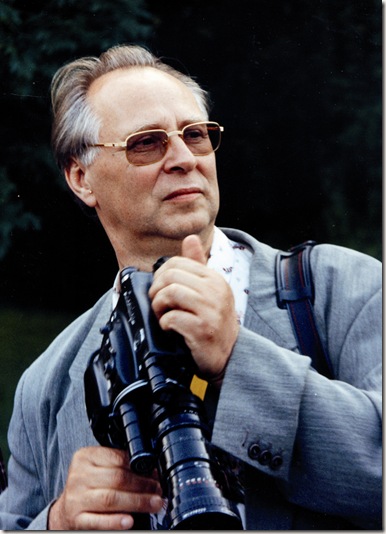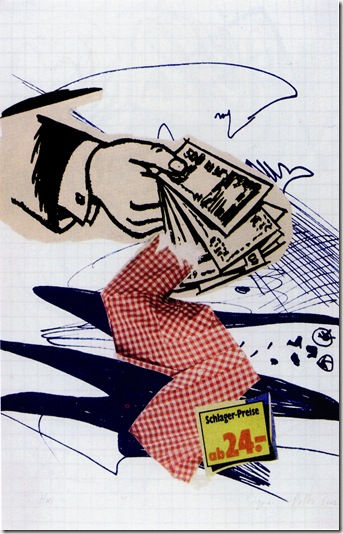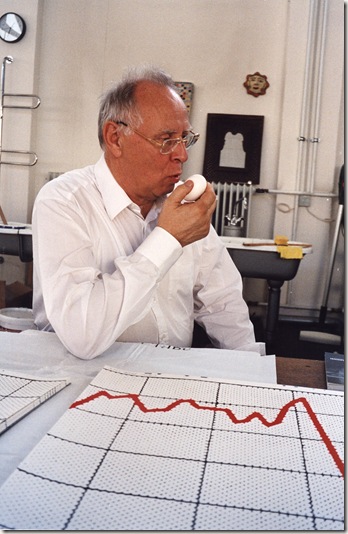Polke, the São Paulo Biennial, and Berlin
by N. Ami
[N. Ami is an American journalist living in Berlin, and a big fan of the Biennial Project.]
An Homage to Sigmar Polke:
Taking Stock of a Friendship Between Artists
Exhibition at the Academy of Arts,
Pariser Platz, Berlin, January – March, 2011.

Sigmar Polke, 1995
Photograph, 8 x 12 inches
Photo by Klaus Staeck
(c) VG Bild-Kunst
by N. Ami
A Remarkable Friendship
For over 40 years, Sigmar Polke and Klaus Staeck were artist pals. Staeck became an art collector, publisher, and gallery owner, and is now President of the Academy of Arts in Berlin. Polke (pronounced “polka”), one of the most influential contemporary artists in Germany, died in June 2010 of cancer at age 69.
Staeck organized this very personal exhibition as a tribute to his friend. Of the more than 90 works by Polke in the show, as well as numerous catalogs and photos of Polke, most are from the private collection of Staeck. I was moved by this show, the record of a remarkable friendship.
Great Exhibition Space
The Academy of Arts is located in prime space and is easy to find. It is a few steps away from the Brandenburg Gate, one of the best known landmarks in Berlin. A renowned cultural center, the Academy’s architecture differs starkly from its massive historic neighbors by its shear glass façade. It has 5 large exhibition rooms, and also houses a fine independent bookstore and spiffy café.
Those 5 rooms give the viewer ample space to see the prolific range of Polke’s experiments in painting, photography, printmaking, and sculpture. Dominant are collage and montage done with offset lithos, serigraphs, and copy-machines. Some of these works are huge, as much as 7ft x 10ft. Overall, these big ones are bright and fanciful. His most usual tools were a camera, a photocopier, and his great wit.

Sigmar Polke: The Cash Is Laughing, 2002
Offset Litho/ Serigraph on Cardboard
28 x 20 inches
Edition Staeck
(c) VG Bild-Kunst
Biennial
Yes, he had work in the XIII Biennial in São Paulo, Brazil, in 1975! A series of those works are included in this show. They were collaborations with the artists Achim Duchow, Astrid Heibach, and Katharina Steffen for the artists’ newspaper called “Day by Day… They Take Some Brain Away.”
These satirical works are, according to the exhibition notes, “a wild mixture of sex, revolution, and sensation as presented in the contemporary politics and men’s fantasies, as seen through the eyes of the bourgeois press.” The pieces are two-sided, printed offset on newsprint. They are indeed wild, with montages from Hollywood film posters, magazine ads, comic books, and political commentary.
The series for the Biennial was done at a time when young German artists watched a new country rise from its fascist ashes. The artists had a healthy anarchistic skepticism, and could observe the new post-war influence of the West with great irony.
For example, in Polke’s 1974 documentary photo series of beggars in New York City and beggars in Cologne, Germany, the two groups appear identical.
Polke and Gerhard Richter had already named their new art movement “Capitalist Realism” in the 1960s.
My Favorites
Most striking are Polke’s very early prints with “raster” grids – now (since computers) known as bitmaps – where he would take a small section of dots on a grid (say, from a conventional newspaper photo or comic book) and enlarge the dot-pattern to a gigantic scale. Then he would playfully work into that abstraction further with drawing and other printmaking.
He learned to “scale-up” this raster beyond recognition and then to create a whole new imagery within it. Technically, he was worlds ahead of other innovators in this area. Best of all, he took his work seriously, but never forgot how to play.
Consider his 1969 sculpture, “A Device With Which One Potato Can Circle Around Another Potato,” about 30 inches high, with two potatoes, wood, rotating metal arms and screws, and a loudly grinding motor. The potatoes can be replaced with newer ones, as needed. The viewer personally turns the electric switch on and off, setting the thing in motion.
My favorite works were a whole wall full of one-page faxes, sent between Polke and Staeck – over a hundred of them between 1995 and 2008. These were little goofy messages and sketches sent by fax, mostly about the two artists arranging meeting times with each other.
These little messages were so lively and real. It made me wish that the two guys could still send each other silly faxes and set more meeting times together.
And it made me wonder why the artists I know don’t send each other homemade things that can be tacked on the wall and saved. I mean, emails are better than nothing, but art is art.
So send your pals something goofy today!! There’s real power in it. And remember that some people die too soon, and then sadly those pals are gone.

Sigmar Polke [eating an egg] with a detail of "Unwelcome Gifts," 2003
Photograph, 8 x 12 inches
Photo by Klaus Staeck
Edition Staeck
(c) VG Bild-Kunst